There are many different ways in which to measure the level of competition between the United States and China and Russia. These are explored at length in a separate Burke Chair report entitled The Biden Transition and U.S. Competition with China and Russia: The Crisis-Driven Need to Change U.S. Strategy, which is available on the CSIS website here.
It is clear, however, that the ways in which the rest of the world perceives the overall character of China, Russia, and the United States is becoming a key form of competition, in which public opinion polls on the attitudes in other countries can provide a non-partisan set of benchmarks and trend indicators that are not subject to the political debates in domestic American politics.
This does not mean that foreign attitudes are objective or correct. One can argue with some justification that many of the current partner and other foreign perceptions of the U.S. are no less objective than U.S. perceptions of partner and foreign states – particularly ones with different religions, political structures, and cultural backgrounds. It is equally true that it is the perceptions and self-interests of the leadership elites in many countries that determine their alignments as strategic partners, rather than those of the average citizen.
In broad terms, however, popular perceptions still count. Popular attitudes towards the U.S. have at least some impact on the behavior of even the most authoritarian states, and they have far more impact on states with moderate and democratic regimes. They affect every aspect of international diplomacy and the behavior of international organizations, and they indirectly help shape the broader structure of deterrence, sanctions, and arms control.
They are particularly important in ensuring that the leadership and democratic character of the U.S. make the United States more respected than Russia and China, and they can give the U.S. a natural advantage in seeking strategic partners. It is important to note, therefore, that recent Pew and Gallup polls – two of the most respected sources of polling data in the world – sound strong warnings that the U.S. has seen a major reduction in partner and other outside support in recent years – to levels roughly similar to outside support for China and Russia.
Here, the trends in the polling data on international support for the U.S., China and Russia from 2002 to 2020, as well as the more recent data from 2018-2020 help to put the trends in support for the U.S. into perspective:1
Chart One shows that many countries distrust China’s present leadership, as well as the way it competes at the economic and military level.
Chart Two shows the same is true of Russia, although President Putin often gets more favorable ratings than President Trump.
Chart Three warns, however, how sharply the U.S. can lose international support if it focuses on its own national self-interest rather than mutual interest and its true strategic partnerships – a warning that directly affects the economic, military, and the political dimensions as well.
Chart Four and Chart Five warn that comparative confidence in the quality of U.S. leadership is low, and that of other countries can be equally negative.
Chart Six shows that such differences have a major impact on international perceptions of the U.S., Chinese, and Russian economies
These polls all precede the partisan election crisis in the United Stated that followed the vote on November 6, 2020, and they cover periods of relative domestic political stability. They do not reflect the impact of the major crises that followed and that reached a peak in the U.S. capitol over the Congressional vote to accept the results of the electoral college on January 6, 2021.
Chart Seven provides a summary by Reuters – a British-Canadian news service – of immediate international reactions to that January 6th crisis. It tracks with other media reporting – especially in reflecting the speed with which China and Russia immediately attempted to exploit the crisis in competing with the U.S.2 It should be stressed, however, that any poll which is taken at a time of exceptional crisis can be far more negative or positive than one taken after those polled have had time to consider those events – a period which could last 4 to 6 months in this case – and where perceptions will quickly shift to focus on the incoming Biden Administration.
Nevertheless, the impact of the negative trends in international attitudes towards the U.S. became all too tangible by 2018 and had become worse by mid-to-late 2020. One tangible example occurred on December 30, 2020. In spite of requests to delay such actions by the incoming Biden Administration, China and the EU agreed in principle to give each other’s companies better access to each other’s markets. This agreement had been stalled by questions about China’s compliance and its human rights action in Hong Kong, but it was pushed to the agreement level by Germany – and it was clear that a good part of China’s success came from anger over the Trump Administrations treatment of the EU.3
If the U.S. is to reverse these longer-term trends in the popular views of its strategic partners and other states – and do so in ways that help it compete with China and Russia – it needs a strategy that focuses on shaping their perceptions of the ways the U.S. compares with China and Russia and that sets out clear criteria for measuring both civil and military competition. Above all, the U.S. must fully justify its strategy in ways that make it clear it is supporting its partners and other states.
Yet, the U.S. also needs to be sensitive to popular views in China and Russia. If the U.S. is to find ways to cooperate with China as well as to compete with and confront it – the U.S. cannot ignore the fact that Chinese nationalism and authoritarianism is at least partly the result of China’s emergence from a period of turmoil, war, and economic imperialism that lasted from the beginning of the Opium Wars in the 1830s until the U.S. opened up to China in 1972.
The U.S. does face real economic and civil threats from China and Russia, but it needs to focus on the areas where these threats are currently real, find effective responses, and deal with the fact it is going to have to share the world with other political systems indefinitely into the future.
Chart One – Part One: Pew Polls of International Respect for China
Publics losing faith in President Xi
% who have no confidence in Chinese President Xi Jinping to do the right thing regarding world affairs
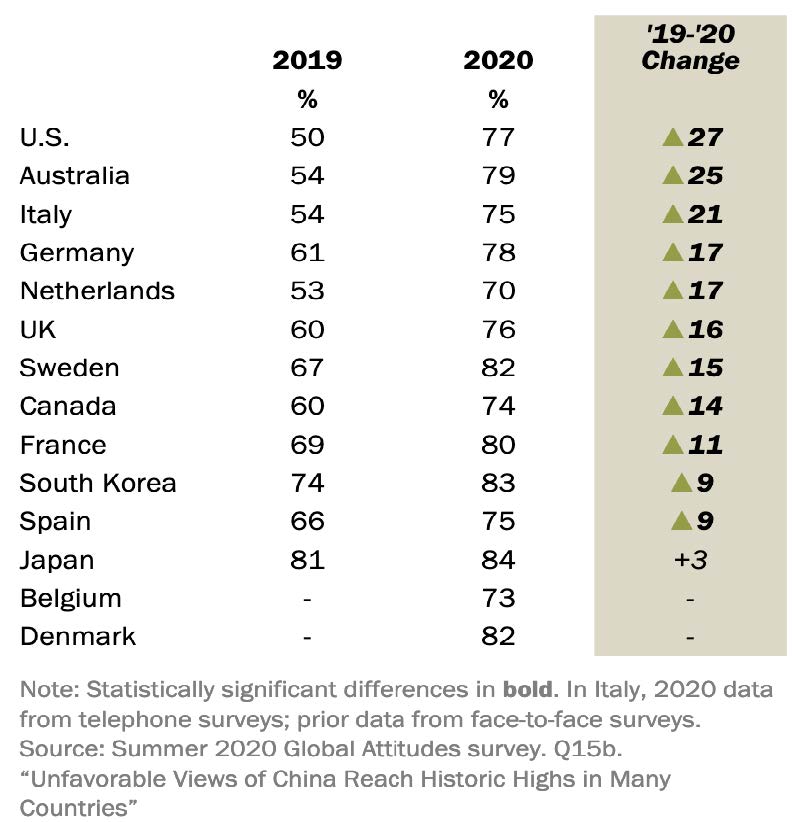 Source: Laura Silver, Kat Devlin, and Christine Huang, “Unfavorable Views of China Reach Historic Highs in Many Countries,” Pew Research Center, October 6, 2020, p. 8-9, https://www.pewresearch.org/global/2020/10/06/unfavorable-views-of-china-reach-historic-highs-in-many-countries/
Source: Laura Silver, Kat Devlin, and Christine Huang, “Unfavorable Views of China Reach Historic Highs in Many Countries,” Pew Research Center, October 6, 2020, p. 8-9, https://www.pewresearch.org/global/2020/10/06/unfavorable-views-of-china-reach-historic-highs-in-many-countries/ Chart One – Part Two: Pew Polls of International Respect for China
Unfavorable views of China prevail
% who have a ___ view of China
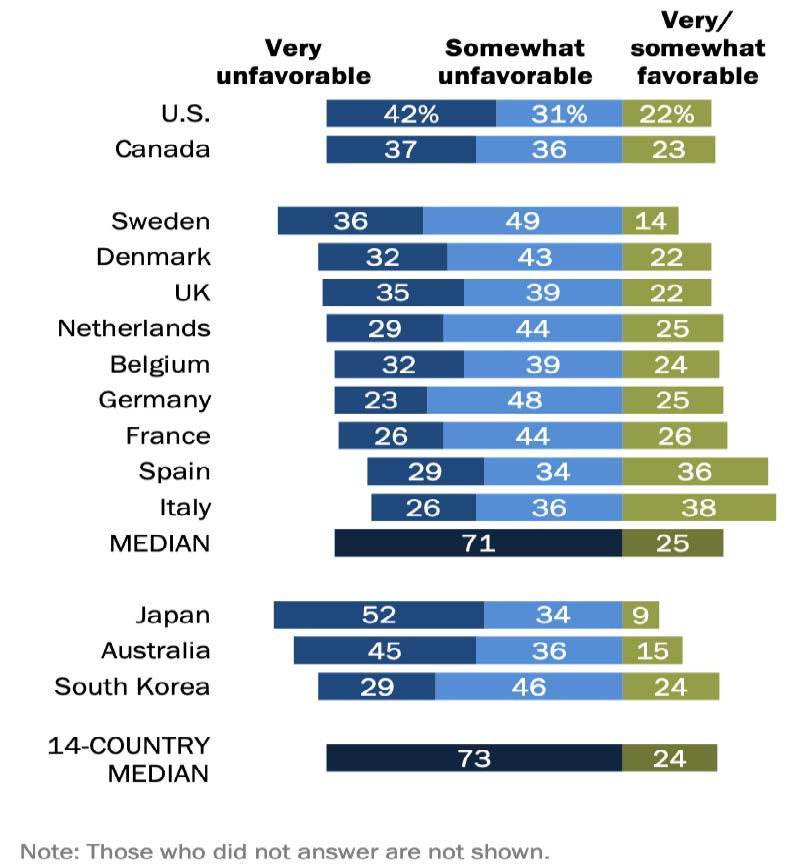 Source: Laura Silver, Kat Devlin, and Christine Huang, “Unfavorable Views of China Reach Historic Highs in Many Countries,” Pew Research Center, October 6, 2020, p. 8-9, https://www.pewresearch.org/global/2020/10/06/unfavorable-views-of-china-reach-historic-highs-in-many-countries/.
Source: Laura Silver, Kat Devlin, and Christine Huang, “Unfavorable Views of China Reach Historic Highs in Many Countries,” Pew Research Center, October 6, 2020, p. 8-9, https://www.pewresearch.org/global/2020/10/06/unfavorable-views-of-china-reach-historic-highs-in-many-countries/. Chart One – Part Three: Pew Polls of International Respect for China
Increasingly negative evaluations of China
% who have an unfavorable view of China
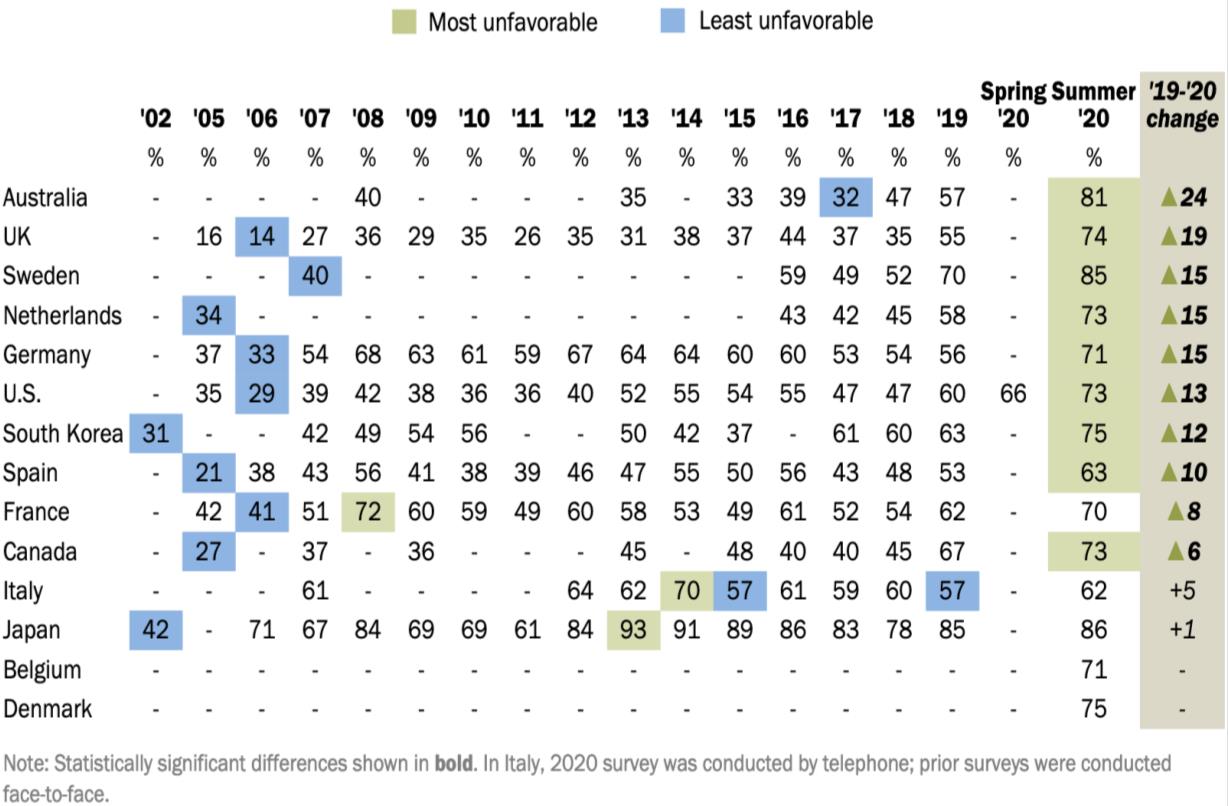 Source: Laura Silver, Kat Devlin, and Christine Huang, “Unfavorable Views of China Reach Historic Highs in Many Countries,” Pew Research Center, October 6, 2020, p. 8-9, https://www.pewresearch.org/global/2020/10/06/unfavorable-views-of-china-reach-historic-highs-in-many-countries/.
Source: Laura Silver, Kat Devlin, and Christine Huang, “Unfavorable Views of China Reach Historic Highs in Many Countries,” Pew Research Center, October 6, 2020, p. 8-9, https://www.pewresearch.org/global/2020/10/06/unfavorable-views-of-china-reach-historic-highs-in-many-countries/. Chart Two - Part One: Pew Polls of International Respect for Russia
Russia garners unfavorable evaluations in Europe, North America and East Asia
% who have a(n) ___ view of Russia
 Source: Christine Huang, “Views of Russia and Putin remain negative across 14 nations,” Pew Research Center, December 16, 2020, https://www.pewresearch.org/fact-tank/2020/12/16/views-of-russia-and-putin-remain-negative-across-14-nations/.
Source: Christine Huang, “Views of Russia and Putin remain negative across 14 nations,” Pew Research Center, December 16, 2020, https://www.pewresearch.org/fact-tank/2020/12/16/views-of-russia-and-putin-remain-negative-across-14-nations/. Chart Two - Part Two: Pew Polls of International Respect for Russia
Views of Russia have fallen sharply in the Last Decade
% who have a favorable view of Russia
 Source: Christine Huang, “Views of Russia and Putin remain negative across 14 nations,” Pew Research Center, December 16, 2020, https://www.pewresearch.org/fact-tank/2020/12/16/views-of-russia-and-putin-remain-negative-across-14-nations/.
Source: Christine Huang, “Views of Russia and Putin remain negative across 14 nations,” Pew Research Center, December 16, 2020, https://www.pewresearch.org/fact-tank/2020/12/16/views-of-russia-and-putin-remain-negative-across-14-nations/. Chart Two - Part Three: Pew Polls of International Respect for Russia
In Europe, more trust Putin than Trump
% who have confidence in __ to do the right thing regarding world affairs
 Source: Christine Huang, “Views of Russia and Putin remain negative across 14 nations,” Pew Research Center, December 16, 2020, https://www.pewresearch.org/fact-tank/2020/12/16/views-of-russia-and-putin-remain-negative-across-14-nations/.
Source: Christine Huang, “Views of Russia and Putin remain negative across 14 nations,” Pew Research Center, December 16, 2020, https://www.pewresearch.org/fact-tank/2020/12/16/views-of-russia-and-putin-remain-negative-across-14-nations/. Chart Three – Part One: Pew Polls of International Respect for U.S. in 2020
In some countries, ratings for U.S. are at record low
% who have a favorable view of the U.S.
 Source: Richard Wike, Jannell Fetterolf, and Mara Mordecai, “U.S. Image Plummet Internationally as Most Say Country Has Handled Coronavirus Badly,” Pew Research Center, September 2020, https://www.pewresearch.org/global/2020/09/15/us-image-plummets-internationally-as-most-say-country-has-handled-coronavirus-badly/.
Source: Richard Wike, Jannell Fetterolf, and Mara Mordecai, “U.S. Image Plummet Internationally as Most Say Country Has Handled Coronavirus Badly,” Pew Research Center, September 2020, https://www.pewresearch.org/global/2020/09/15/us-image-plummets-internationally-as-most-say-country-has-handled-coronavirus-badly/. Chart Three – Part Two: Pew Polls of International Respect for U.S. in 2020
Few have positive opinion of U.S.
% who have a ___ view of the U.S.
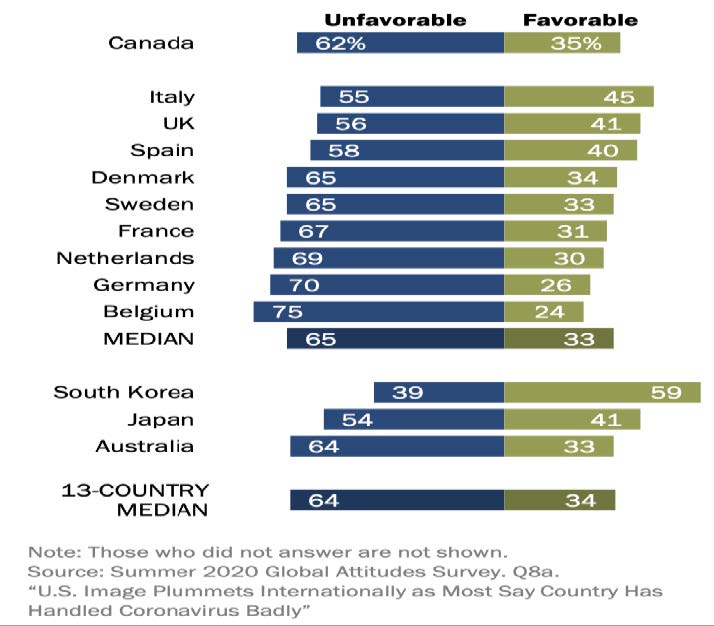 Source: Richard Wike, Jannell Fetterolf, and Mara Mordecai, “U.S. Image Plummet Internationally as Most Say Country Has Handled Coronavirus Badly,” Pew Research Center, September 2020, https://www.pewresearch.org/global/2020/09/15/us-image-plummets-internationally-as-most-say-country-has-handled-coronavirus-badly/.
Source: Richard Wike, Jannell Fetterolf, and Mara Mordecai, “U.S. Image Plummet Internationally as Most Say Country Has Handled Coronavirus Badly,” Pew Research Center, September 2020, https://www.pewresearch.org/global/2020/09/15/us-image-plummets-internationally-as-most-say-country-has-handled-coronavirus-badly/. Chart Three – Part Three: Pew Polls of International Respect for U.S. in 2020
U.S. favorability
% who have a favorable view of the U.S.
 Source: Richard Wike, Jannell Fetterolf, and Mara Mordecai, “U.S. Image Plummet Internationally as Most Say Country Has Handled Coronavirus Badly,” Pew Research Center, September 2020, https://www.pewresearch.org/global/2020/09/15/us-image-plummets-internationally-as-most-say-country-has-handled-coronavirus-badly/.
Source: Richard Wike, Jannell Fetterolf, and Mara Mordecai, “U.S. Image Plummet Internationally as Most Say Country Has Handled Coronavirus Badly,” Pew Research Center, September 2020, https://www.pewresearch.org/global/2020/09/15/us-image-plummets-internationally-as-most-say-country-has-handled-coronavirus-badly/. Chart Four – Part One: Gallup Polls of International Respect for U.S. Leadership
 Source: Julie Ray, “Biden Inherits a Battered U.S. Image Abroad,” Gallup, December 17, 2020, https://news.gallup.com/poll/327629/biden-inherits-battered-image-abroad.aspx.
Source: Julie Ray, “Biden Inherits a Battered U.S. Image Abroad,” Gallup, December 17, 2020, https://news.gallup.com/poll/327629/biden-inherits-battered-image-abroad.aspx. Chart Four – Part Two: Gallup Polls of International Respect for U.S. Leadership - 2020
 Source: Gallup, Rating World Leaders: The U.S. vs. Germany, China and Russia, 2020, https://www.gallup.com/analytics/315824/gallup-global-leadership center.aspx, and Julie Ray, “Biden Inherits a Battered U.S. Image Abroad,” Gallup, December 17, 2020, https://news.gallup.com/poll/327629/biden-inherits-battered-image-abroad.aspx.
Source: Gallup, Rating World Leaders: The U.S. vs. Germany, China and Russia, 2020, https://www.gallup.com/analytics/315824/gallup-global-leadership center.aspx, and Julie Ray, “Biden Inherits a Battered U.S. Image Abroad,” Gallup, December 17, 2020, https://news.gallup.com/poll/327629/biden-inherits-battered-image-abroad.aspx. Chart Four – Part Three: Gallup Poll of International Respect for U.S. Leadership – Asia and Middle East - 2018-2019
 Source: Gallup, Rating World Leaders: The U.S. vs. Germany, China and Russia, 2020, https://www.gallup.com/analytics/315824/gallup-global-leadership center.aspx.
Source: Gallup, Rating World Leaders: The U.S. vs. Germany, China and Russia, 2020, https://www.gallup.com/analytics/315824/gallup-global-leadership center.aspx. Chart Five: Pew Polls of Comparative Confidence in International Leaders in 2020
 Source: Richard Wike, Jannell Fetterolf, and Mara Mordecai, “U.S. Image Plummet Internationally as Most Say Country Has Handled Coronavirus Badly,” Pew Research Center, September 2020, https://www.pewresearch.org/global/2020/09/15/us-image-plummets-internationally-as-most-say-country-has-handled-coronavirus-badly/.
Source: Richard Wike, Jannell Fetterolf, and Mara Mordecai, “U.S. Image Plummet Internationally as Most Say Country Has Handled Coronavirus Badly,” Pew Research Center, September 2020, https://www.pewresearch.org/global/2020/09/15/us-image-plummets-internationally-as-most-say-country-has-handled-coronavirus-badly/. Chart Six – Part One: Global Perceptions of Which State was the World’s Leading Economic Power in 2020
 Source: Richard Wike, Jannell Fetterolf, and Mara Mordecai, “U.S. Image Plummet Internationally as Most Say Country Has Handled Coronavirus Badly,” Pew Research Center, September 2020, https://www.pewresearch.org/global/2020/09/15/us-image-plummets-internationally-as-most-say-country-has-handled-coronavirus-badly/. Laura Silver, Kat Devlin, Christine Huang, Unfavorable Views of China Reach Historic Highs in Many Countries, Pew Research Center, October 6, 2020, https://www.pewresearch.org/global/2020/10/06/unfavorable-views-of-china-reach-historic-highs-in-many-countries/. Source: Summer 2020 Global Attitudes survey. Q14.“
Source: Richard Wike, Jannell Fetterolf, and Mara Mordecai, “U.S. Image Plummet Internationally as Most Say Country Has Handled Coronavirus Badly,” Pew Research Center, September 2020, https://www.pewresearch.org/global/2020/09/15/us-image-plummets-internationally-as-most-say-country-has-handled-coronavirus-badly/. Laura Silver, Kat Devlin, Christine Huang, Unfavorable Views of China Reach Historic Highs in Many Countries, Pew Research Center, October 6, 2020, https://www.pewresearch.org/global/2020/10/06/unfavorable-views-of-china-reach-historic-highs-in-many-countries/. Source: Summer 2020 Global Attitudes survey. Q14.“ Chart Six – Part Two: Global Perceptions of Which State was the World’s Leading Economic Power in 2020
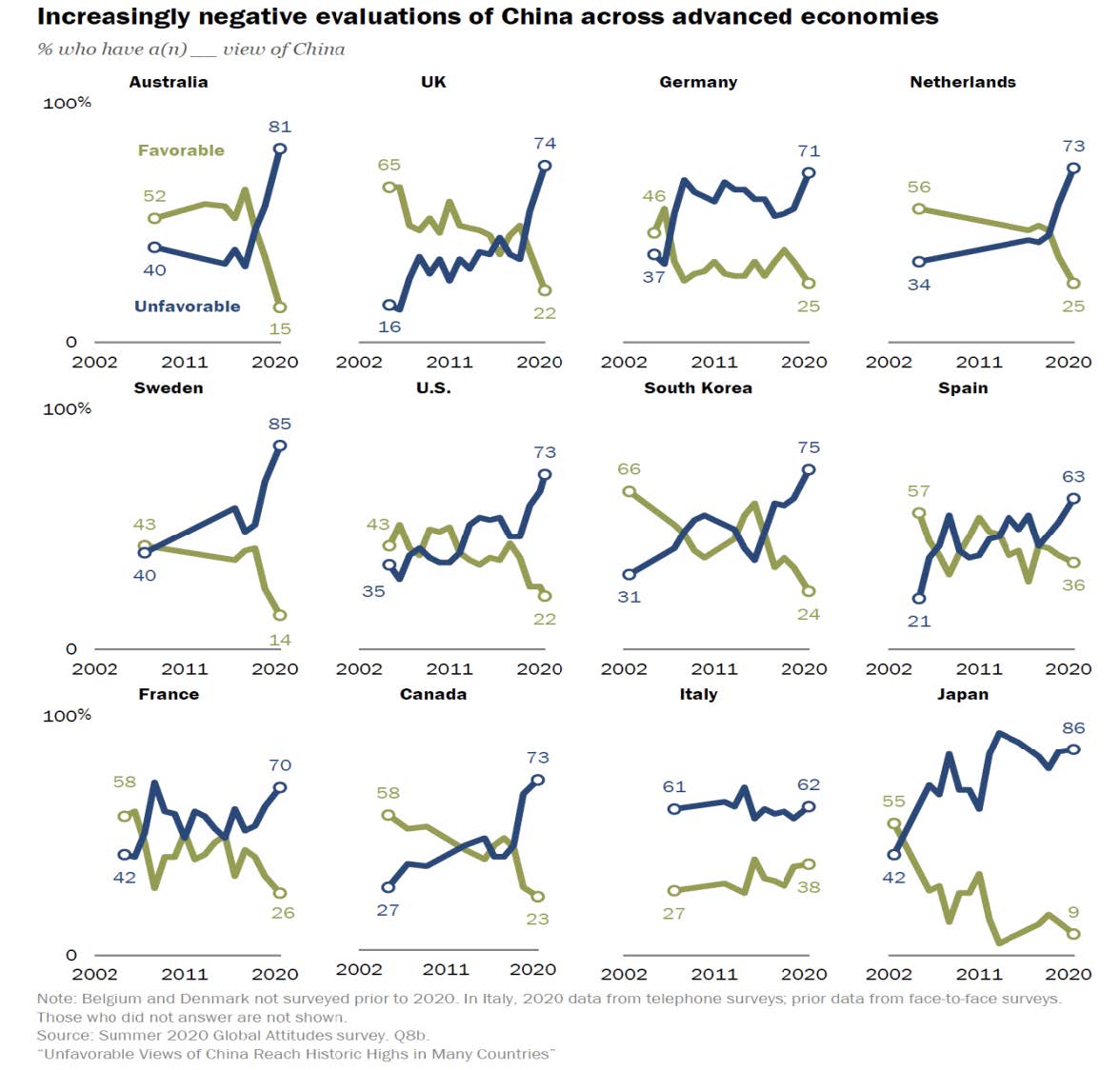 Source: Richard Wike, Jannell Fetterolf, and Mara Mordecai, “U.S. Image Plummet Internationally as Most Say Country Has Handled Coronavirus Badly,” Pew Research Center, September 2020, https://www.pewresearch.org/global/2020/09/15/us-image-plummets-internationally-as-most-say-country-has-handled-coronavirus-badly/. Laura Silver, Kat Devlin, Christine Huang, Unfavorable Views of China Reach Historic Highs in Many Countries, Pew Research Center, October 6, 2020, https://www.pewresearch.org/global/2020/10/06/unfavorable-views-of-china-reach-historic-highs-in-many-countries/. Source: Summer 2020 Global Attitudes survey. Q14.“
Source: Richard Wike, Jannell Fetterolf, and Mara Mordecai, “U.S. Image Plummet Internationally as Most Say Country Has Handled Coronavirus Badly,” Pew Research Center, September 2020, https://www.pewresearch.org/global/2020/09/15/us-image-plummets-internationally-as-most-say-country-has-handled-coronavirus-badly/. Laura Silver, Kat Devlin, Christine Huang, Unfavorable Views of China Reach Historic Highs in Many Countries, Pew Research Center, October 6, 2020, https://www.pewresearch.org/global/2020/10/06/unfavorable-views-of-china-reach-historic-highs-in-many-countries/. Source: Summer 2020 Global Attitudes survey. Q14.“ Chart Seven – Reuters Summary of Immediate Foreign Reactions to the Political Crisis in the Capitol on January 6, 2020
UNITED NATIONS SECRETARY-GENERAL: U.N. Secretary-General Antonio Guterres was “saddened” by the events at the U.S. Capitol, his spokesman said. “In such circumstances, it is important that political leaders impress on their followers the need to refrain from violence, as well as to respect democratic processes and the rule of law,” U.N. spokesman Stephane Dujarric said in a statement.
CHINA: China drew a comparison between the storming of the U.S. Capitol and last year’s often-violent pro-democracy protests in Hong Kong, but noted that no one had died when demonstrators took over the legislature of the China-ruled city. Four people died in the Washington violence, police said. “We also wish that U.S. people can enjoy peace, stability and security as soon as possible,” foreign ministry spokeswoman Hua Chunying told a daily briefing.
RUSSIA: “Quite Maidan-style pictures are coming from DC,” Russia’s deputy U.N. Ambassador Dmitry Polyanskiy posted on Twitter, referring to protests in Ukraine that toppled Russian-backed President of Ukraine Viktor Yanukovich in 2014. “Some of my friends ask whether someone will distribute crackers to the protesters to echo the Victoria Nuland stunt,” he said, citing a 2013 visit to Ukraine when then-U.S. Assistant Secretary of State Victoria Nuland offered food to protesters.
IRAN: “What happened in America showed what a failure Western democracy is ... A populist man (Trump) damaged the reputation of his country,” Iran’s President Hassan Rouhani said in a televised speech.
INDIA: “Distressed to see news about rioting and violence in Washington DC,” Indian Prime Minister Narendra Modi said in a tweet. “Orderly and peaceful transfer of power must continue. The democratic process cannot be allowed to be subverted through unlawful protests.”
JAPAN: “We decline to comment on President Trump’s political style as this is about U.S. domestic affairs,” Japan’s Chief Cabinet Secretary Katsunobu Kato told reporters. “But we hope to see democracy in the United States overcome this difficult situation, calmness and harmony regained, and a peaceful and democratic transfer of power.”
ISRAEL: “Since its independence, America, our great and true friend, has been a beacon of democracy, and stood for the values of freedom, justice and independence,” Israeli Foreign Minister Gabi Ashkenazi said on Twitter. “I am sure that the American people and their elected representatives will know how to fend off this attack and will continue to defend the values on which the United States was founded.”
FRANCE: “What happened today in Washington DC is not American, definitely,” French President Emmanuel Macron said in a video message on Twitter.“We believe in the strength of our democracies. We believe in the strength of American democracy,” he said, speaking in English.
UNITED KINGDOM: British Prime Minister Boris Johnson in a tweet called the events in the U.S. Congress a “disgrace”, saying the United States stood for democracy around the world and that was it was “vital” now that there should be a peaceful and orderly transfer of power.
GERMANY: German Foreign Minister Heiko Maas said democracy’s enemies would be cheered by scenes of violence at the United States Capitol, and he called on Trump to accept U.S. voters’ decision. In a Tweet, Maas said the violence had been caused by inflammatory rhetoric. “Trump and his supporters must accept the decision of American voters at last and stop trampling on democracy.”
NATO: NATO Secretary-General Jens Stoltenberg called the violent protests in Washington “shocking scenes” and said the outcome of the democratic U.S. election must be respected.
SPAIN: Spanish Prime Minister Pedro Sanchez said in a tweet: “I am following with concern the news that are coming from Capitol Hill in Washington. I trust in the strength of America’s democracy. “The new Presidency of @JoeBiden will overcome this time of tension, uniting the American people.”
IRELAND: Ireland’s foreign minister Simon Coveney called the scenes in Washington “a deliberate assault on Democracy by a sitting President & his supporters, attempting to overturn a free & fair election! The world is watching! We hope for restoration of calm.”
TURKEY: Turkey’s foreign ministry issued a statement expressing concern about the violence and called for calm and common sense while urging its citizens to avoid crowds and the protest area.
EUROPEAN UNION: Charles Michel, chairman of EU leaders, on Twitter expressed his shock at the scenes in Washington. “The US Congress is a temple of democracy...We trust the US to ensure a peaceful transfer of power to @JoeBiden. ”European Commission President Ursula von der Leyen said: “I believe in the strength of US institutions and democracy. Peaceful transition of power is at the core. @JoeBiden won the election. I look forward to working with him as the next President of the USA.”
CZECH REPUBLIC: “What happened in USA is unacceptable and unprecedented attack on democracy,” Czech Prime Minister Andrej Babis said on Twitter. “Transition of power needs to be smooth and peaceful.I firmly believe that these incidents should cease.”
CANADA: Canadian Prime Minister Justin Trudeau expressed his concern about events in Washington. “Obviously we’re concerned and we’re following the situation minute by minute,” Trudeau told the News 1130 Vancouver radio station. “I think the American democratic institutions are strong, and hopefully everything will return to normal shortly.”
SWEDEN: Swedish Prime Minister Stefan Lofven in a tweet described the scenes as “an attack on democracy”. “President Trump and many members of Congress bear significant responsibility for what’s now taking place. The democratic process of electing a president must be respected.”
NORWAY: Norwegian Prime Minster Erna Solberg posted on Twitter: “This is an unacceptable attack on the U.S. democracy. President Trump is responsible for stopping this. Scary images, and unbelievable that this is happening in the United States.”
FINLAND: Finnish Prime Minister Sanna Marin said in a statement: “The attack on Capitol Hill in Washington DC is a very serious and worrying matter. It shows how important it is to firmly and strongly defend democracy at all times.”
AUSTRALIA: Australian Prime Minister Scott Morrison described the scenes in Washington as “distressing.” “We condemn these acts of violence and look forward to a peaceful transfer of Government to the newly elected administration in the great American democratic tradition,” he posted on Twitter.
NEW ZEALAND: New Zealand Prime Minister Jacinda Ardern said on Twitter: “Democracy - the right of people to exercise a vote, have their voice heard and then have that decision upheld peacefully should never be undone by a mob. Our thoughts are with everyone who is as devastated as we are by the events of today. I have no doubt democracy will prevail.”
VENEZUELA: Venezuelan Foreign Minister Jorge Arreaza tweeted: “Venezuela expresses its concern for the violent events that are taking place in the city of Washington, USA; condemns the political polarization and hopes that the American people will open a new path toward stability and social justice.”
ARGENTINA: Argentine President Alberto Fernandez tweeted: “We express our condemnation of the serious acts of violence and the affront to Congress that occurred today in Washington DC. We trust that there will be a peaceful transition that respects the popular will and we express our strongest support for President-elect Joe Biden.”
Reporting by Humeyra Pamuk and Michelle Nichols and Reuters bureaux; Editing by Lisa Shumaker, Grant McCool and Raju Gopalakrishnan.
Source: Reuters staff, “World stunned by Trump supporters storming U.S. Capitol, attempts to overturn election, Thomson Reuters, January 6, 2021, 4:43 ”https://www.reuters.com/article/us-usa-election-international-reaction-f/world-stunned-by-trump-supporters-storming-u-s-capitol-attempts-to-overturn-election-idUSKBN29B2VS
This commentary entitled, Making America Great? Global Perceptions of China, Russia, and the United States: The International Scorecard, is available for download at https://csis-website-prod.s3.amazonaws.com/s3fs-public/publication/210107_Cordesman_America_Great.pdf.
Anthony H. Cordesman holds the Arleigh A. Burke Chair in Strategy at the Center for Strategic and International Studies in Washington, D.C. He has served as a consultant on Afghanistan to the United States Department of Defense and the United States Department of State.


No comments:
Post a Comment